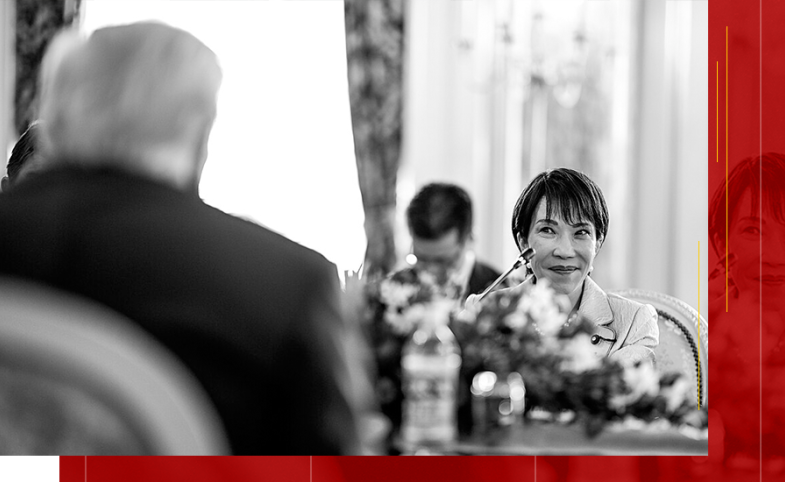The CPD Blog is intended to stimulate dialog among scholars and practitioners from around the world in the public diplomacy sphere. The opinions represented here are the authors' own and do not necessarily reflect CPD's views. For blogger guidelines, click here.

Public Diplomacy in the News: China’s Wolf-Warrior Rhetoric, Climate Disinformation, & Olivia Rodrigo's Deportation Stand
“Public Diplomacy in the News” is a CPD Blog series by Andrew Dubbins that spotlights noteworthy stories on public diplomacy topics such as cultural diplomacy, nation branding, exchange programs, international events and conferences, digital diplomacy, and strategic global communications.
China’s "wolf-warrior" rhetoric returns. China’s furious reaction to Japanese Prime Minister Sanae Takaichi’s (pictured above) comments on a Taiwan contingency has reignited a hard-edged diplomatic style many believed Beijing had set aside. After Takaichi suggested in Parliament that a Chinese blockade or assault on Taiwan could constitute a “survival-threatening situation” for Japan, Chinese officials and nationalist voices unleashed threats and insults, including a Chinese consul general’s post vowing that her “filthy head” should be cut off. The clash exposed long-running historical grievances, Beijing’s sensitivity to any Japanese involvement in Taiwan, and the fragility of recent efforts to soften China’s diplomatic tone. Analysts now see the episode as a clear sign that wolf-warrior tactics are again central to Beijing’s messaging toward Tokyo.
Andrew Higgins and Javier C. Hernández / The New York Times
Climate disinformation surges alongside COP30. A new watchdog report finds that despite strong global support for climate policies, coordinated disinformation campaigns are rapidly expanding online and undermining public trust in climate science as world leaders gather in Belém for COP30. Researchers documented a 267% spike in COP-related falsehoods—including AI-generated fake videos, conspiracy narratives in Brazilian Telegram groups, and messaging amplified by political leaders and Big Carbon companies—while tech platforms continue to enable their spread. In response, COP30 is launching its first-ever Global Initiative for Information Integrity on Climate Change, as leaders from Brazil, France, and the UN warn that disinformation threatens democratic processes, climate agreements, and global security.
Hannah Docter Loeb / Euro News
Olivia Rodrigo pushes back against deportation messaging. Pop star Olivia Rodrigo condemned the Trump administration after Homeland Security and ICE used her song “All-American Bitch” in a social-media video promoting self-deportation, sparking a high-profile clash over immigration enforcement and artistic consent. Rodrigo, a visiting USC student, blasted the repurposing of her music as “racist, hateful propaganda,” prompting DHS to defend its actions and rebuke her criticism, while fans amplified her deleted comment and highlighted her long-standing opposition to harsh deportation tactics in Los Angeles.
Moscow’s cultural offensive in Africa. Russia is accelerating a continent-wide soft-power campaign by expanding its network of “Russian House” cultural centers, which promote pro-Kremlin narratives, deepen diplomatic ties, and seek to attract African youth through language programs, arts events, and scholarships. As Moscow courts new allies during its protracted war in Ukraine, more than a dozen new centers have opened or are planned across Africa, often reviving Soviet-era outreach sites and signaling warmer relations in countries like Mali, Burkina Faso, and Equatorial Guinea. These centers blend cultural programming with geopolitical messaging, offering education opportunities and showcasing Russian culture while critics argue they operate as vehicles for propaganda and strategic influence that help Russia “punch above its weight” in regions where Western engagement has waned.
Brawley Benson / The Moscow Times
Winning the new AI space race. The United States can maintain global leadership in artificial intelligence only by investing in powerful, publicly accessible research infrastructure that matches the scale and urgency of China’s rapid advances, argues Tom Secunda for U.S. News. With technology accelerating and geopolitical rivals racing ahead, state-led initiatives like New York’s Empire AI consortium and Florida’s HiPerGator supercomputer demonstrate a bipartisan model: pooling public, private, and philanthropic resources to provide researchers with cutting-edge computing power, attract talent, spur regional economic growth, and ensure scientific innovation serves broad national interests rather than remaining siloed within Big Tech. Expanding such regional AI hubs nationwide—supported by federal funding and university partnerships—offers a clear path for America to preserve its competitive edge and shape the global future of AI.
Visit CPD's Online Library
Explore CPD's vast online database featuring the latest books, articles, speeches and information on international organizations dedicated to public diplomacy.
POPULAR ARTICLES
-
January 29
-
January 20
-
January 28
-
January 2
-
January 8
Join the Conversation
Interested in contributing to the CPD Blog? We welcome your posts. Read our guidelines and find out how you can submit blogs and photo essays >.









